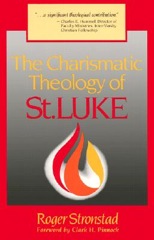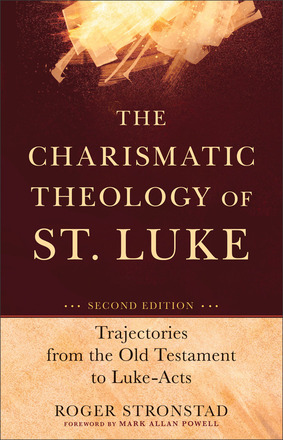Roger Stronstad: The Charismatic Theology of St. Luke

First edition cover of The Charismatic Theology of St. Luke from Hendrickson (1984).
Roger Stronstad, The Charismatic Theology of St. Luke (Hendrickson, 1984), 83 pages.
For many years Pentecostals have been known as doers of the Word, but not as theologians who write of it. Roger Stronstad is among a growing body of scholars seeking to change this and provide a solid theological basis, within an evangelical hermeneutical framework, for Pentecostal preaching and teaching.
Stronstad assumes Lucan authorship, both for the gospel that bears Luke’s name and for the Book of Acts, and considers them to be two volumes of one book. He also correctly believes that Luke is not only a master historian, but also a theologian. In stating this, he does not avoid the issues regarding the relationship between Pauline and Lucan theology but argues brilliantly that Luke, who wrote more of the New Testament than anyone else, including Paul, must be taken seriously as a theologian in his own right. Consequently, he argues, Luke’s theology must not be subordinated to Paul’s, but stands on equal footing. Luke, not Paul, must therefore interpret Lucan phrases such as “baptized in the Spirit” or “filled with the Spirit”.

Second edition cover of The Charismatic Theology of St. Luke: Trajectories from the Old Testament to Luke-Acts from Baker Academic (2012).
He then moves to develop a theology of the Spirit within the Lucan corpus. Anchoring his pneumatology in the Old Testament, especially the Septuagint, Luke draws many motifs and comparisons regarding the activity of the Spirit, and explaining that Jesus was the ultimate anointed of God. He also contrasts the difference in the activity of the Spirit from the Old Testament to the New Testament, citing Joel 2:28 ff. as a watershed. Here he emphasizes that in the Old Testament the Spirit only came upon certain individuals, and in the New Testament he is poured out on the entire community of believers, regardless of gender or social class.
While the book has many strengths, there are two weaknesses; one theological and one practical. First, while he makes a strong case for the Baptism in the Holy Spirit being an experience separate from the initial experience of salvation, that it is vocational in nature, he does not adequately deal with the issue of initial evidence for the Baptism. One would expect more on this. Second, the author uses many difficult terms and large words, making the use of his book next to impossible for laymen and the growing number of preachers in developing nations who are trained by English textbooks but only speak and read English as a second, third, or even fourth language.
In all, this work is a solid contribution to Pentecostal theology and successfully answers the critics who claim that Pentecostal theology is exegetically weak. I recommend this book highly with the suggestion that it should be in the library of any serious student of the Holy Spirit and the Word .
Reviewed by Dave Johnson
Publisher’s page: http://bakerpublishinggroup.com/books/the-charismatic-theology-of-st-luke-2nd-edition/340170


